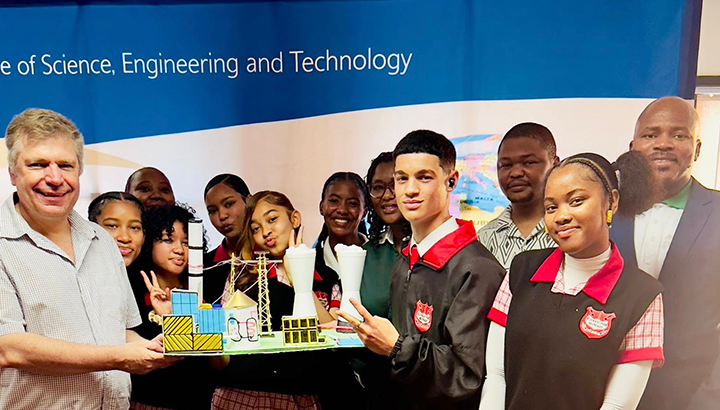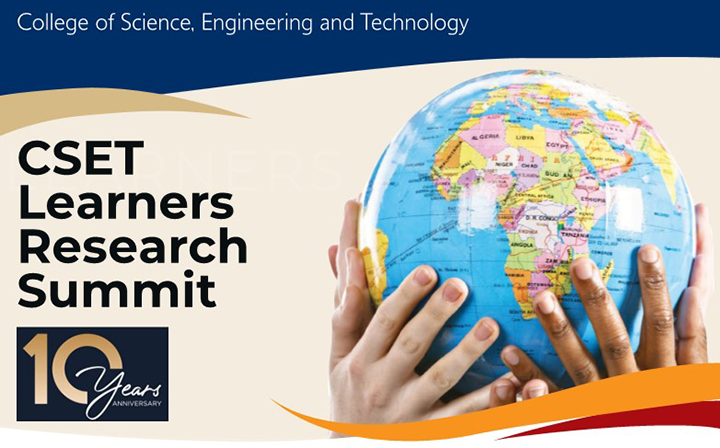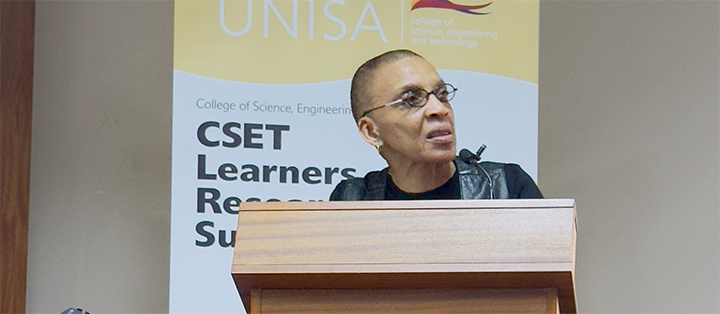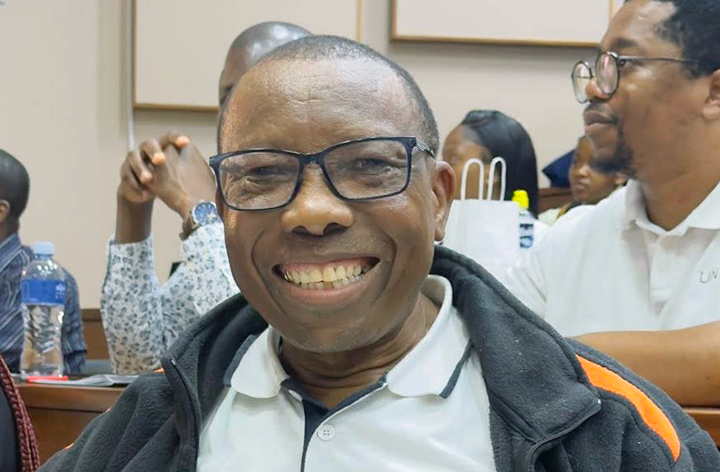News & Events
Ten years of empowering learners to impact their communities through research

Learners presenting their research-based project
On 13 September 2025, Unisa’s College of Science, Engineering and Technology (CSET) hosted the tenth annual instalment of its Learners’ Research Summit (LRS) under the theme “Ten years of empowering learners’ research for community impact”.
The event was hosted at the Unisa Science Campus in Florida, Johannesburg, and witnessed the participation of thirteen schools from within Gauteng. The LRS is part of the CSET’s engaged scholarship initiatives and provides high school learners with an opportunity to present and showcase their proposed research projects in line with an identified theme or focus area.

The focus this year was on Unisa’s ten catalytic niche areas, and learners had the opportunity to present their interpretation of each niche area through a show-and-tell presentation. Each school was paired with academics from the college, who provided mentorship and guidance throughout the year provided mentorship and guidance throughout the year on proposed research-based solutions aligned with a specific niche area.
The keynote speaker on the day was Professor Gugu Moche, Group Executive for Digital Transformation and Acting Deputy CEO at the National Research Foundation (NRF). She was also previously Executive Dean at CSET. Moche reflected on when and why the CSET LRS was established. She emphasised that the idea behind the college embarking on this endeavour was to develop research skills, confidence, and motivation in high school learners to pursue higher education and contribute to the country's success.

Prof Gugu Moche
“From the time the project started, a lot has changed within a short space of time, but have you changed with it?” she asked the audience. She then reflected on past learners who participated in the LRS programme and are now students at the university:
- Thandi Mokoena comes from a village in Limpopo and is a rural innovator who created batteries for solar panels and a solar-power blend for cell phones. She is now a third-year student in Electrical Engineering at Unisa.
- Sipho Dlamini from Soweto had the opportunity to represent the country at the Mathematical Olympiad and is now a postgraduate student focusing on mathematical modelling for climate change.
- Zanele Khumalo was raised by her grandmother in KwaZulu-Natal and researched medicinal plants traditionally used in her community. She is now an honours student in Biomedical Sciences, focusing on indigenous knowledge systems for health innovation.
- Lerato Maseko, a digital pioneer from Mamelodi, created a mobile app providing matriculants with access to past examination papers. The Department of Basic Education and Training is now using this app.
Moche asserted that the common factor in all the learners’ success stories was their curiosity and resilience. “You need not come from challenging backgrounds to rise, but what this shows us is that your background should not stop you,” she said.
In her concluding remarks, she said, “Today is a celebration of what is possible. Contrary to popular belief, what is possible comes with education. You should be able to look at yourselves and see what is possible.”
The event also honoured the contributions made by Mathabathe Molope, a retired teacher from Edward Phatudi High School, who has been involved with the LRS programme from inception. He had an opportunity to reflect on the past ten years of LRS. He brought with him previous learners from the programme who are now practising actuarial scientists, industrial engineers, and data scientists.

Mathabathe Molope
Said Molope: “We took the strategy of the LRS to the classroom and the schools at large and encouraged our learners to research and discover knowledge themselves. In this way, the knowledge is never forgotten. If you tell me, I will forget. If you show me, I will remember. But if you involve me, I will never forget.”
Learners from various schools had the opportunity to present their research-based solutions in each of the catalytic niche areas. These ranged from converting waste into energy and transforming trash into treasure for renewable energy provision, 4IR and digitisation solutions, sustainable water provision, and aids to addressing the food crisis.
The day ended with the ceremonial cutting of a cake to mark the tenth anniversary of the initiative. Special thanks was extended to mentors from the college, and teachers and learners from participating schools. The schools participating were Willow Crescent Secondary School, Daliwonga Secondary School, Bokgoni Technical School, Eldorado Park Senior Secondary School, Flavius Mareka Secondary School, Saulridge High School, Tulip Combined School, Mandisa Shiceka School of Specialisation, Katlehong Secondary School, Riverlea High School, Holy Trinity Secondary School, Willowmead Secondary School, and Nellmapius High School.
It is safe to say that these young and passionate individuals are destined to make a significant contribution to a brighter future for our country.
* By Dr Nozipho N Madzivha, Communications and Marketing Specialist (acting), College of Science, Engineering and Technology
Publish date: 2025-10-28 00:00:00.0

